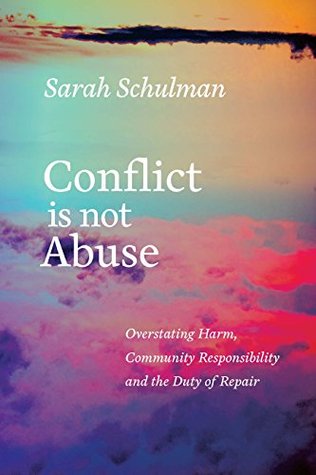More on this book
Community
Kindle Notes & Highlights
People who are being punished for doing nothing, for having normative conflict, or for resisting unjustified situations, need the help of other people. While there are many excuses for not intervening in unjust punishment, that intervention is, nonetheless, essential. Without the intervention that most people are afraid to commit to, this escalation cannot be interrupted. In other words, because we won’t change our stories to integrate other people’s known reasons and illuminate their unknown ones, we cannot resolve Conflict in a way that is productive, equitable, and fair. This is why we
...more
Without in any way minimizing the role of violence in our lives, I am looking, simultaneously, at how a heightened rhetoric of threat that confuses doing nothing, normative conflict, and resistance with actual abuse, has produced a wide practice of overstating harm. And that this overstatement of harm is often expressed in “shunning,” a literal refusal to speak in person with another human being, or group of people, an exclusion of their information, the active obstruction to a person being heard and the pretense that they do not exist. I am examining the inaccurate claiming of “abuse” as a
...more
Namely, false accusations of harm are used to avoid acknowledgment of complicity in creating conflict and instead escalate normative conflict to the level of crisis.
This central role of anxiety in escalating Conflict is one of the reasons why, in our contemporary time, email and texts are so often the source for tragic separations of potentially enriching relationships. First of all, email and text are both unidirectional and don’t allow for return information to enhance or transform comprehension. We must speak to each other, especially when events or feelings are fraught. I wish that all the people of the industrial world would sign a pledge that any negative exchange that is created on email or text must be followed by a live, in-person conversation.
...more
This highlight has been truncated due to consecutive passage length restrictions.
Refusing to speak to someone without terms for repair is a strange, childish act of destruction in which nothing can be won. Like all withholding, it comes from a state of rage, and states of rage are products of the past. As some say, “If it’s hysterical, it’s historical.” By refusing to talk without terms, a person is refusing to learn about themselves and thereby refusing to have a better life. It hurts everyone around them by dividing communities and inhibiting learning. When we have terms (e.g., “You stole my money to buy drugs so I will talk to you about this when you have three years
...more
Without conversation, it is the person with the most limitations who is in control. The desirable goal for all of us is not to restrict those who can, but to bring more communication skills to those who can’t. Refusal through email, texting, and other technologies keeps the person who doesn’t know how to problem-solve from learning how. It keeps them imprisoned in their own imagined negative fears about the other, and their fantasies of their own potential humiliation or demise if they were to talk to the other person and thereby understand what the other person is thinking and feeling. Often
...more
This highlight has been truncated due to consecutive passage length restrictions.
In another example from other people’s lives, sometimes angry, supremacist, or traumatized people send emails commanding, “Do not contact me.” I want to state here, for the record, that no one is obligated to obey a unidirectional order that has not been discussed. Negotiation is a human responsibility. Little children order their parents around: “Mommy, sit there!” When adults give orders while hiding behind technology, they are behaving illegitimately. These unilateral orders do not have to be obeyed. They need to be discussed. Two people in a situation means two experiences, two points of
...more
The performative conceit at the root of this kind of assaultive action is the melodrama that email orders are a “last resort” in response to some horrible transgression. But the opposite is more likely true. Often a real conversation would illuminate nuances and correct misunderstandings. The real question is: Why would a person rather have an enemy than a conversation? Why would they rather see themselves as harassed and transgressed instead of have a conversation that could reveal them as an equal participant in creating conflict? There should be a relief in discovering that one is not being
...more


